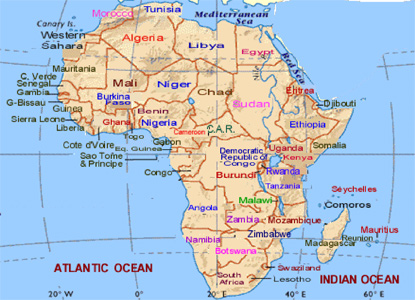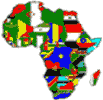; STATS___
About Africa |
|||||||||||||||||||||||||||||||||||||||||||||||||||||||||||||||||||||||||||||||||||||||||||||||||||||||||||||||||||||||||||||||||||||||||||||||||||||||||||||||||||||||||||||||||||||||||

Welcome to Africa! Africa is the second largest continent. The continent is divided into 54 different countries. It has 48 mainland and 6 island states - with an estimated total population of 700 million. Follow this link to learn more about African Countries .
African History: Africa a land of enchantment, intrigue, diversity; from Tunisia in the north to the Republic of South Africa in the south (4,970 miles), and Senegal in the west to Somalia in the east (4,700 miles), it is the world's second largest continent. Its more than 16,000 miles of coastline is bathed by the North Atlantic, South Atlantic, and Indian oceans, as well as the Mediterranean and Red Seas. The continent is basically a huge island with its only connection to another land mass, Asia, at the Isthmus of Suez which separates the Mediterranean and Red Seas. The climate is mostly tropical with indigenous flora and fauna that exists only in Africa. Its great beauty, from vast grasslands to eastern mountains, deserts to lush vegetation, tropical birds to animals of immense strength and size has enchanted individuals and the nations of Europe for centuries. Although northern Africa was known to the ancient Phoenicians (a group of powerful cities on the eastern Mediterranean in the area of current day Lebanon), they, along with the Greeks, Romans, Turks and Persians, knew practically nothing about the vast lands south of a line through northern Sudan that extended across the continent. Central and southern Africa was an enigma that remained unvisited and unchallenged by the ancient and early empires of Europe and Asia. It is difficult to understand why these great empires did not explore the vast African continent that lay south of Sudan (Northeastern Africa). The topography of the region and the climate apparently created an impenetrable barrier beyond which humans did not wish to pass. Conjecture has it that ancient peoples believed that the temperature of the lands south of the Sudan were too high for human survival. With the exploits of Prince Henry the Navigator in the 1400s, Portugal was the first European country to go beyond the known limits of northern Africa, exploring the lower west coast and returning to Portugal with captured slaves and other riches. In 1442, the Portuguese began a trade that would not end until the 1800s; producing gold and slaves for the country. However, the Portuguese did not invent slavery. It dates back to the ancient Greeks keeping slaves, and Moses leading the Israelites out of bondage in Egypt. Vasco da Gama in 1498, reinforced Portugal's control of the slave trade during a voyage that sailed around the Cape of Good Hope into the Indian Ocean. This epic discovery of a sea route to the east was soon followed by the establishment of Portuguese colonies on the continent's coast that produced spiraling riches in the slave trade for Portugal. Rumors of wealth in this newly discovered region captured the interest of other European powers, including England, Spain, Holland, Denmark and France. Within a few years, Africa's coastal regions became home to thousands of European colonists, traders and explorers who bought and plundered the valuable resources of the native inhabitants. Serious exploration of the continent's interior took place during the 18th and 19th centuries with such luminaries as James Bruce, Mungo Park, Martin Liechtenstein, Hugh Clapperton, Richard and John Lander, Heinrich Barth, Sir Richard Francis Burton, John Hanning Speke, James Augustus Grant, Sir Samuel White Baker, David Livingstone, and the hundreds of Christian missionaries who ventured inland to live among the natives. With the founding of the African Association in 1788, many of these white explorers traveled throughout Africa under the auspices of this and other respected associations. The most famous and enduring of these illustrious explorers was the internationally renowned David Livingstone whose activities in the deepest regions of the continent proved invaluable in the mapping of Africa's interior. His most famous recorded meeting, after the outside world had received no news of his whereabouts and feared for his safety, came when he was found by the American journalist/explorer Henry M. Stanley, whose infamous words on meeting Livingstone, " Dr. Livingstone, I presume?," have immortalized both of them. It was 1870, and Livingstone and Stanley explored the region together until Livingstone set out separately to reach the source of the Nile River. In 1871, he died in a native village, and, although his remains are interred in Westminster Cathedral, his followers, upon his death in Africa, buried his heart beneath a tree at the spot where he succumbed. He was greatly respected by African tribes for his devotion to Africa and its people, including his disgust of the slave trade that still permeated the continent even after it had been outlawed. Livingstone was considered one of the pioneers in its final demise. The exploration of Africa allowed the world to view the abundance of natural resources that ultimately resulted in the conquest of its inhabitants and the colonization of its land by European settlers. The continent was literally carved up by the European nations, particularly England and France; establishing new country boundaries that foolishly disregarded tribal homeland perimeters, causing tribal wars, dissension, and anxieties that have perplexed Africans ever since. Slavery, in all its repugnance, has an origin that began in ancient times when conquering armies, and tribes, in Europe and Asia found it more profitable to enslave captives than to massacre them. Most ancient Asian nations, including the Jews, had slaves that were bought and used to perform various functions. In medieval Europe, slaves were known as serfs, a title that cast them as members of the lowest feudal order. Owned by the Lord of the Manor, they served his wishes, labored in his fields, and relied on him for sustenance. Black slavery between antagonistic tribes existed in Africa long before the advent of the Portuguese in the 1400s. However, they and the other powerful nations of Europe developed a trading in black slaves that evolved beyond the tenet that prisoners of war were more valuable in human bondage than in death by convincing the powerful native empires of Africa that exchanging their prisoners of war, and other blacks, for European products was more beneficial than enslaving them. Portuguese slave trading and kidnapping, beginning in 1442, particularly on the west coast in an area that became known as the 'Slave Coast' (present day nations of Togo, Dahomey, and Nigeria), caused the Spanish in 1517 to enter the lucrative market, followed by the English (1553), the French (1624), and soon after by Holland, Denmark and the American colonies. Africa's estimated population was 100,000,000, nearly 20% of the world's population, in 1650; 90,000,000 (1800); 95,000,000 (1850); and 120,000,000 in 1900. The first Negroes (20) arrived at Jamestown, Virginia, in 1619 aboard a Dutch ship, not as slaves, but as servants, much like other unfortunate Indians and whites, who were committed to periods of four to seven years servitude. Many of America's early destitute immigrants would sign papers of indentured service in order to pay for their passage to the new world or support them in their early years of residency. Pre-Arab Egypt, Africa's first great historical kingdom and a major cradle of civilization, flourished for nearly 3,000 years from approximately 3000 BC. The whole of North Africa fell to the Romans after 146 BC. The Arab Islamic invasions of Africa began in the 7th century AD. The first empire of which there is extant knowledge was ancient Ghana with its capital at Kumbi, which flourished from the 5th to the 11th century AD. During the same period came the rise of the empire of Kanen-Bornu around Lake Chad, which reached the height of its power in the 17th century. Muslim empires were Mali (c. 1250-1400) and its successor, the Songhai of Gao (c. 1400-1591). East African-Arab settlements developed into powerful city-states: Mogadishu, Mombasa, Lamu, Kilwa, and others, by the 13th century. In the 16th century, those city-states were destroyed by the Portuguese. The Portuguese were in turn ousted by the Omani Arabs who established the slave-trading state of Zanzibar. The Bantu-speaking empire of Mwene Matapa and other dynasties arose inland from the East African coast. The kingdom of the Kongo was located near the mouth of the Congo River, and others lay farther south. Most of these empires were weakened and in many cases destroyed by the early colonial powers from Europe and Arabia that coveted their trade and supplanted them, turning much of the trade to external rather than internal markets and creating new trade goods, notably slaves. The number of slaves actually taken from Africa probably numbered about 10,000,000. The Portuguese were the first Europeans to undertake systematic voyages of discovery along the African coast (15th century). The Dutch presence in South Africa dates from 1652. By 1884 European countries had begun a scramble to partition Africa. By 1920 every square mile of Africa except for Ethiopia, Liberia, and the Union of South Africa was under colonial rule. Independence movements in Africa developed primarily in Ghana and became widespread after 1950, and, one by one, the colonies became independent. Geography: Africa is the second largest continent on earth, occupying 20% of the Earth's land area. Africa measures about 5,000 miles (8,000 km) from north to south and about 4,600 miles from east to west. Africa's land area is roughly 11.724 ml. sq. ml. (30.3657 ml. sq. km). The coastline of Africa is18,950 miles. The prime meridian (0º longitude) crosses Africa from north to south, passing through Tema near Accra in Ghana. The Nile River is the world's longest river, spanning 4,160 miles from the Mediteranean Sea in North East Africa to Lake Victoria in South East Africa. Other long rivers in Africa are the Congo, Niger, Zambezi, and Orange rivers. Africa's share of the world's major mineral reserves is estimated as follows: 8% petroleum, 27% bauxite, 29% uranium, 20% copper, 67% phosphorites, and substantial reserves of iron ore, manganese, chromium, cobalt, platinum, and titanium. Algeria, Egypt, Libya, and Nigeria are the major petroleum and natural gas producing countries in Africa. Botswana, Congo (D. R.), and South Africa together produce 50% of the world's diamonds. Ghana, South Africa, and Zimbabwe together produce nearly 50% of the world's gold. Africa has an average elevation of about 2,200 feet (670 m). The East African Rift System constitutes Africa's most extensive mountain system. The highest mountain in Africa is Mt Kilimanjaro (19,317 ft) in Tanzania. The Atlas Mountains along the northwestern coast rise to more than 13,000 feet (4,000 m)The Sahara is the world's largest contiguous desert with 3.5 million square miles of land area. Other major deserts in Africa are the Namib and the red-sanded Kalahari in southern Africa. The African continent is cut almost equally in two by the equator. Most of Africa lies within the tropical region, bounded on the north by the tropic of Cancer and on the south by the tropic of Capricorn. The largest lake in Africa is Lake Victoria, the chief reservoir of the Nile river. Other great lakes in Africa are Tanganyika (in Tanzania and Congo) and Nyasa in (Tanzania and Malawi). Only about 6% of Africa is arable; nearly 25% is forested or wooded. The largest country in Africa is Sudan spanning 968,000 sq mi. Africa's population is slightly less than 14% of the total world population. The most prevalent diseases in Africa include malaria, dysentery, tuberculosis, whooping cough, typhoid fever, gonorrhea, and AIDS. Africa's major languages include Arabic (North), Berber (Morocco and Algeria), Bantu group of languages (central and southern Africa), Swahili (Kenya, Tanzania, Uganda), Akan (Ghana, Cote d'Ivoire), Saharan and Maba (Chad basin), Koma (the Blue Nile basin), and Songhai (upper-middle Niger River region). African Countries
African Flags
|
|||||||||||||||||||||||||||||||||||||||||||||||||||||||||||||||||||||||||||||||||||||||||||||||||||||||||||||||||||||||||||||||||||||||||||||||||||||||||||||||||||||||||||||||||||||||||

© Copyright 2005 African Ministers Charter, Inc. All Rights Reserved. | Terms and Conditions



















































